![[Updated] The Complete Guide to iTunes Podcast Upload](https://thmb.techidaily.com/865ed323eb71130c7276babe580275f4674927ba17ed6f4bfafe6ec23c46bab1.jpg)
[Updated] The Complete Guide to iTunes Podcast Upload

The Complete Guide to iTunes Podcast Upload
We’ve all heard about Apple’s podcast platform (Apple Podcasts). It’s one of the world’s most extensive podcast streaming services. So how did it get there? And how can you get on the platform yourself?
This article dives deep into Apple’s podcast strategy. It includes how to submit to Apple Podcasts, why you should and how to improve your chances of getting on the platform.
Part 1. Prepare Your Show for Apple Podcast Submission
Apple Podcasts submission is an excellent opportunity to earn severe exposure to your podcast. It would be best to start by sending your show to Apple for review. Then, we’ll help you with the steps to get your podcast accepted on Apple Podcasts.
![]()
Note: Apple Podcasts is not a podcast-hosting site. You’re not uploading your audio files to Apple. Instead, you’re telling Apple where to find your audio files on the web. Apple finds your files via an RSS feed that links to your hosting site.
Publish an episode on a hosting site
The first requirement of Apple Podcasts is a published episode. You need to give Apple a list to start. It can be a trailer or your first podcast episode posted on a hosting site. You can use any hosting service to publish your episode. One of the best is buzzsprout which offers hosting services, promotion, and marketing opportunities for podcasters.
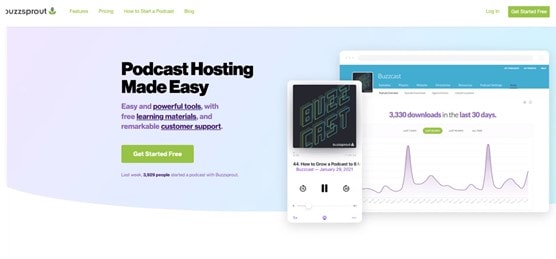
A podcast hosting site stores your podcast files and distributes them to various podcast streaming platforms using an RSS feed. Your hosting site will automatically submit your podcast to podcast streaming platforms. But with the Apple podcast, you will have to submit manually only once.
Part 2. How To Submit Podcasts to Apple Podcasts?
If you’re not submitting your podcast to Apple Podcasts, you’re missing out on the opportunity to earn revenue from ads and sponsorships. So we set out to find the easiest way to submit a podcast to Apple Podcasts and make it easy for everyone else.
After publishing your first episode to a podcast hosting site, there are a few required fields that you can find on settings:
- Podcast description
- Podcast artwork (square)
- Apple Podcasts category
- Language selection
- Explicit checkbox
It’s time to submit your show to Apple Podcasts.
Step1 Go to Apple Podcasts directory instructions in Buzzsprout and click ‘Get listed.’
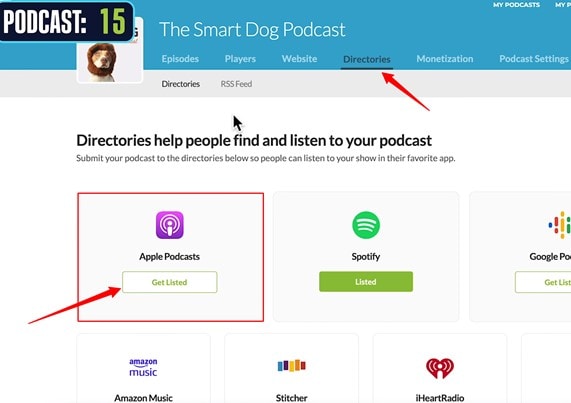
Step2 You can see that we have already done steps 1 and 2, according to Apple. Now scroll down, and you’ll find your RSS feed URL. Copy your unique URL and click the ‘Launch Apple Podcasts Connect Website’ button.
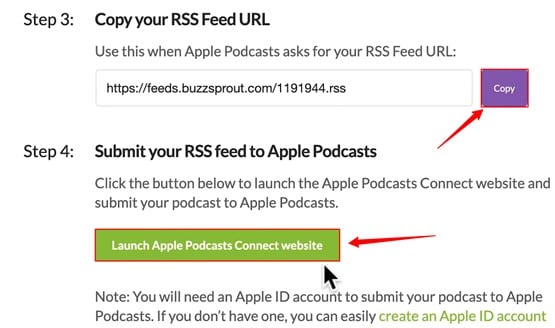
Step3 You’ll be redirected to Apple Podcasts login website. You can put your existing Apple id or create a new one by clicking on ‘Create your now.’
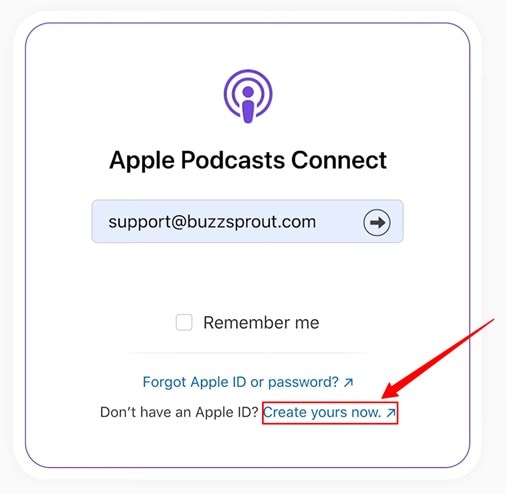
Step4 Once logged in, go to the ‘Podcasts +’ sign on the top left. Click the purple + sign and then click the ‘New Show.’
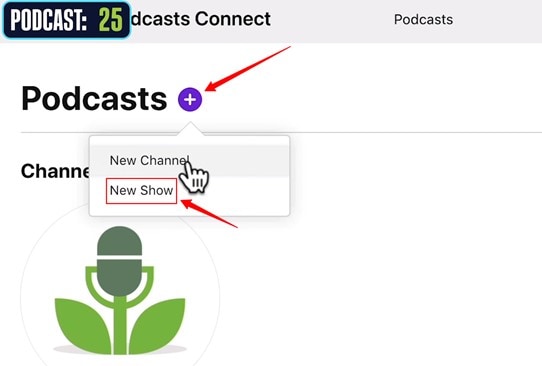
Step5 After clicking on the new show, a window will appear, giving you two options. Click on the option that says, ‘Add a show with an RSS feed,’ and click next. Then it asks for an ‘RSS Feed URL.’ Paste the RSS feed URL you copied from buzzsprout and click ‘Add.’

Step6 Once the RSS feed is added, the Apple Podcasts app will fetch all of the information related to that link. It will take a few minutes, but once it’s fetched, you can validate it and save it. Finally, click ‘Submit For Review’ to get verified. After 72 hours, you can see your podcasts listed in Apple Podcasts.
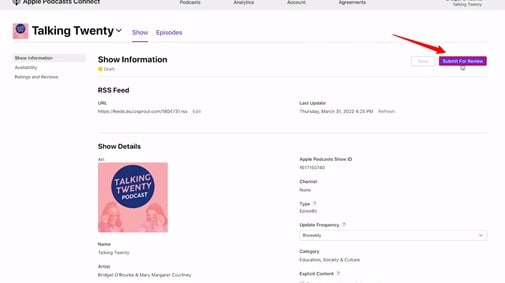
Technical requirements for RSS feed
Apple requires podcasts to comply with specific technical requirements and to provide quality content to provide an excellent experience for their listeners. Here are some requirements for an RSS feed from Apple:
- Show artwork and allow streaming playback of your episodes.
- RSS feed URLs must be publicly addressable.
- Only ASCII filenames and URLs.
- All episodes must contain a GUID, which never changes.
- Each episode must have a unique
tag and its three required components — URL, length, and type.
Part 3. Why Get Feed Validation Errors?
Validation errors occur when the RSS feed isn’t formatted correctly or contains something it shouldn’t.
Invalid characters
An invalid feed is often caused by one or more “invalid” characters that need to be removed or edited—for example, using a series of dashes “-“ in the description to create a line break or an episode file that contains characters other than 0-1, a-z, or A-Z.
Formatted incorrect
An episode file uploaded using a file type that isn’t supported by Apple Podcasts and other podcast listening platforms. We recommend uploading audio files as MP3 files and video episodes as MP4 files.
Well, there are two ways to reach the root cause:
- Troubleshoot a failed validation by external tools. There are many to choose from, like Cast Feed Validator and Podbase Podcast Validator.
- Get help from hosting providers. We suggest checking your hosting provider’s support forums or contacting the original hosting platform for assistance. They usually provide service with setting up RSS feeds.
Part 4. Best Practices for Submitting a Podcast to Apple Podcasts
Your podcast submission may seem like a hassle at first, but once you have all of your materials organized and submitted, it will be much easier. By following these best practices for submitting a podcast to Apple Podcasts, you’ll be well on your way to achieving podcasting success.
Fill out RSS feed data
One big mistake people make when filling out RSS feed data is failing to do so. The problem is that many RSS readers can only read the feeds you have specified. Therefore, if you do not fill out all the required fields, it will not show up to your reader.
That is the most important practice you need to do. Make sure you put the data that Apple Podcasts requires in there.
Compelling description
The description of your podcast is one of the first things people see, and it’s also one of the last things people see before downloading. For a listener to give the episode a second look, they first need to know that it’s something they should listen to. Therefore, it would be best to make a compelling description to convince someone to listen to your show.
Some basic rules of thumb for writing a good description:
- Include a clear subject line.
- Introduce your topic.
- Explain how the episode relates to the rest of your show.
Bold cover art
A simple way to add personality to your podcast is by using bold cover art. It shows that you care about the quality of your audio content, and the image communicates your message. The cover art should be proactive and distinctive but subtle enough not to distract from the show itself.
Remember that most people use mobile devices to browse podcasts. That means your cover art must be easily readable on small screens. So having minimal text with large fonts is the best option.
Conclusion
Apple has been criticized by podcasters who claim that Apple’s podcast submission process is complex, confusing, and challenging to navigate. So that’s where we come in.
This article discusses what it takes to get featured on the Apple Podcasts podcast directory. We discuss what it means to get featured on Apple Podcasts, why you should be submitting your show, and why it’s worth it.
Also read:
- [New] Hot Ticket Video Countdown of the Hour for 2024
- [New] The Ultimate Guide to Quality iPhone Filmmaking (Top 8 Tips)
- [New] Unveiling the Secrets to Premiere's Full Screen Mode
- [Updated] Tactical Phone Data Shift Android to iPhone
- [Updated] The Premier Top-Ten Creative Av Media Maker Directory
- [Updated] The Ultimate Blueprint for Setting Up Google Meet
- 2024 Approved 5 Best Title Makers Online
- 2024 Approved Perfect Your Online Storytelling Top 101 Tips for Facebook Biographies
- Identifying Signs of GPU Failure: Expert Insights From YL Software Solutions
- In 2024, How To Stream Anything From Honor Magic 6 Lite to Apple TV | Dr.fone
- In 2024, The Ultimate Low-Cost Cameras List
- In-Depth Apple TV 4K Analysis: Experience Superior HD and Voice Command Features
- Legal FB Audio Hoarder (LFAH) for 2024
- The 8-Step Formula for Captivating Your Instagram Audience with Reels for 2024
- The Definitive Strategy to Correct the Missing or Damaged Msxml4.dll Error
- The Ultimate Tutorial on Adding Programming Scripts to Your Doc Files
- Title: [Updated] The Complete Guide to iTunes Podcast Upload
- Author: Daniel
- Created at : 2024-11-25 21:04:31
- Updated at : 2024-11-28 22:06:01
- Link: https://some-skills.techidaily.com/updated-the-complete-guide-to-itunes-podcast-upload/
- License: This work is licensed under CC BY-NC-SA 4.0.